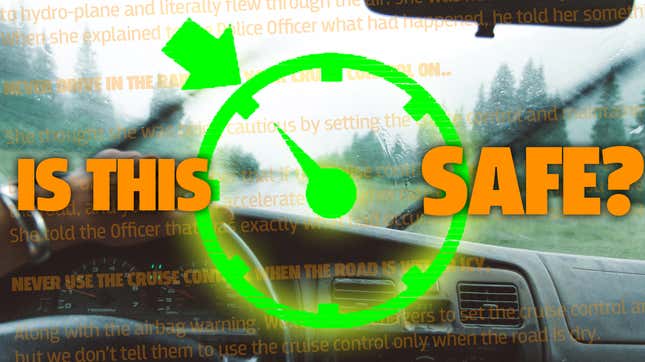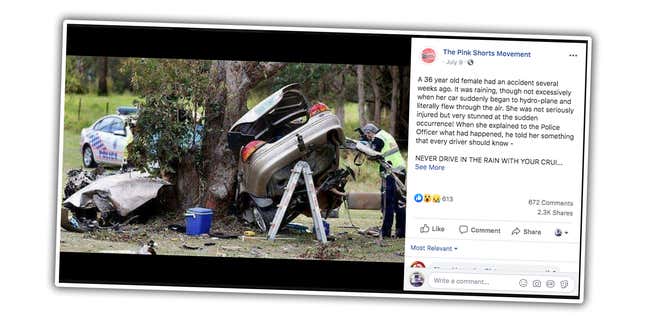
The internet is really useful for many things, ranging from letting your wi-fi enabled refrigerator to blast Yoo-Hoo ads 24/7 to letting you play Canasta with a naked man halfway across the world. But one of the things it truly excels at is spreading misinformed hysteria, often about driving. Such a case is the persistent and dire “don’t use cruise control in the rain” warning that has been floating around for well over a decade.
I only encountered it recently, a few days ago, when a friend asked me if this hyperbolic Facebook post on the traffic safety group The Pink Shorts Movement was accurate:

“A 36 year old female had an accident several weeks ago. It was raining, though not excessively when her car suddenly began to hydro-plane and literally flew through the air. She was not seriously injured but very stunned at the sudden occurrence! When she explained to the Police Officer what had happened, he told her something that every driver should know -
NEVER DRIVE IN THE RAIN WITH YOUR CRUISE CONTROL ON..
She thought she was being cautious by setting the cruise control and maintaining a safe consistent speed in the rain....
But the Police Officer told her that if the cruise control is on, your car will begin to hydro-plane when the tires lose contact with the road, and your car will accelerate to a higher rate of speed making you take off like an airplane. She told the Officer that was exactly what had occurred. The Officer said this warning should be listed, on the driver’s seat sun-visor -
NEVER USE THE CRUISE CONTROL WHEN THE ROAD IS WET OR ICY,
Along with the airbag warning. We tell our teenagers to set the cruise control and drive a safe speed – but we don’t tell them to use the cruise control only when the road is dry.
The only person the accident victim found who knew this, (besides the Officer), was a man who’d had a similar accident, totaled his car and sustained severe injuries..
NOTE: Some vehicles (like the Toyota Sienna Limited XLE) will not allow you to set the cruise control when the windshield wipers are on.
Even if you send this to 15 people and only one of them doesn’t know about it, it’s still worth it. You may have saved a life.”
Okay, so, first, being the savvy internet-users you are, you may have noticed that the whole tone of this just, you know, feels like bullshit. Like when your friend posts that their 6-year-old just articulately expressed wonder about why we humans can’t live in harmony, or like most of the shit on LinkedIn.
Also, this part:
“...your car will begin to hydro-plane when the tires lose contact with the road, and your car will accelerate to a higher rate of speed making you take off like an airplane.”
...is absolute horseshit. You cannot accelerate to a “higher rate of speed” (is there any other outcome when you accelerate? And can’t you just say “speed?”) while hydroplaning because if your tires are not making contact with the road, there’s no way you can actually continue to accelerate.
Sure, you can be sliding out of control and it absolutely feels terrifying when you hydroplane, but what’s described here isn’t accurate.
The bigger question, of course, is whether or not it is actually dangerous to use cruise control in the rain. I did a bit of research and found some pretty mixed opinions. Our sibling site Lifehacker came out supporting the cruise-in-the-rain ban back in 2014, and you can find this issue being discussed, either supporting or debunking, as far back as 2006 at least.
I wanted to get some real expert input on this question, because it’s really not as cut-and-dry as “never use cruise control in the rain” or “don’t worry at all, use cruise control in the rain.” That’s why I reached out to Robert Beaver, Continental Automotive’s Chief Engineer of Vehicle Dynamics in North America. Continental is a developer and supplier of cruise control systems for a number of automakers.
Robert explained a lot about the situation described in these posts and email forwards and articles. First of all, he made it clear that it’s not just rain that causes possible hydroplaning dangers, it has to be a lot of rain, enough so that there’s a significant amount of standing water on the road surface. Here’s what he said:
“First of all, you have to have a certain depth of water for hydroplaning. The tire tread washes water away, and that’s what keeps contact between the tire and the ground. If you have too much water where the tire can’t wash it away, so you lose contact between the tread and the ground, and the car will skid or yaw when that happens.
Now, when that happens, the stability control system in the car will kick in, and just through physics the car will begin to slow down...it might feel to people like the car’s accelerating, but it doesn’t accelerate—in order to accelerate, there has to be some mechanism to move the vehicle.
If you do enter a traction control event, or an ABS event, or a stability event, it’ll kick the cruise control off.”
That last line is especially significant. What that’s saying is that as soon as a car on cruise in heavy rain begins to hydroplane or skid or experience some other loss of control, cruise control kicks off.
This isn’t unique to one particular brand, this is how all cruise control systems work, and have worked since the widespread adoption of vehicle stability systems in the early 1990s.
So, unless something is wrong with your cruise control system, if you’re using it in the rain and you encounter a situation where the car begins to lose control, the cruise control system will be turned off immediately. It will not attempt to keep accelerating the car.
Even cars older than the 1990s will kill the cruise control from even the briefest tap on the brakes; if a cruise setup keeps accelerating, something is very wrong.
Now, while that means that accidents like the one described in that oft-copied warning post are not likely at all to happen, at least not because of what the cruise control system was doing after the initial loss of control, there still are reasons why you may not want to use cruise control in really bad weather.
Robert also made clear that the reason why you may not want to use it is simply that when you’re driving in heavy rain, with a lot of puddles on the road, you’ll want to pay more attention to the conditions you’re driving in, and cruise by definition is something that lets you not pay attention to a crucial aspect of driving.
Cruise control just understands that you want to keep the car at a set speed; so, if you have it on, and you’ve slowed down or are going uphill, it will apply more throttle to get you back to your set speed, regardless of whether or not the conditions are appropriate to be accelerating.
This isn’t really a problem with cruise control, it’s a problem with the driver’s decision to use cruise control. Of course, for most drivers, if you’re begin to feel like the amount of acceleration is unsafe, a simple tap on the brake will kick cruise off, no problem.
So, here’s the upshot to all this: you absolutely can use cruise control safely in the rain. At the same time, that does not mean that every single rainy weather driving situation is one that makes sense to have cruise control on. If the road conditions are really wet and slippery, it’s smarter to not use cruise because it is no longer advantageous to keep a set, unchanging speed. You may encounter road situations that demand a much lower speed, and you as a driver will want to be in control of that.
That said, no cruise control system on the market today will just keep accelerating after any sort of control loss happens, and hydroplaning does not make you go faster until you fly off the road and crash into a Chipotle.
The takeaway here is to drive at speeds that make sense for the conditions of the road you’re on, and if those conditions are variable enough that you can feel that you’ll likely need to occasionally slow down, then of course don’t use cruise control, because that’s just not what it’s for.
All good? You can drive in the rain with cruise control, just you know, pay a little attention to the world around you, and be ready to turn it off if you feel uncomfortable, or, if not, know that it will kick itself off if there’s any loss of control.
Please send this to your grandma so she’ll finally stop pestering you about it.